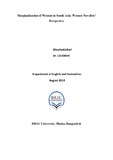Marginalization of women in south asia: women novelists’ perspective
Abstract
This thesis looks into the position of women in three significant novels written in English by South Asian authors, Arundhati Roy’s The God of Small Things, Anita Desai’s Clear Light of Day and Bapsi Sidhwa’s Ice Candy Man. It explores and evaluates the portrayal of women as minority or marginalized to show that disadvantages and oppression of women run through generations and this has its effect on all, including individuals, families and society. In this regard, I have concentrated on the various female characters and their experiences in the novels of South Asia. I have observed that South Asian society still relies on many conventional norms and values and women have to deal with the traditions. So my focus will be on the expectations of the male-oriented society and also on the approaches the women adopt to revolt against them. This will take into consideration the respective women’s religions, castes and social statuses. The first chapter of my thesis provides some background information on the authors and novels including comments on the position of female writers in South Asia. The following three chapters analyze the female characters in the above mentioned texts. This analysis will focus on how the image of a traditional South Asian womanhood is imposed on these females and their reaction to it. Here, I will attempt to describe why some characters submit themselves to the traditional norms they face and there are some who challenge the rules repeatedly. In all of the texts, the traditional notion of women’s position has been questioned and challenged. It is shown how these women are reminded of those expectations and their reactions to these conventions. The female characters in the novels come from different geographical regions and have different social and religious backgrounds. The findings of these chapters will be then concluded in the very last chapter. The thesis therefore focuses on the fact that there are some rules most likely to be broken and there are some which compel women in society to cross the line.
Description
This thesis is submitted in partial fulfillment of the requirements for the degree of Master of Arts in English, 2014.Department
Department of English and Humanities, BRAC UniversityType
ThesisCollections
- Thesis, B.A. (English) [634]

